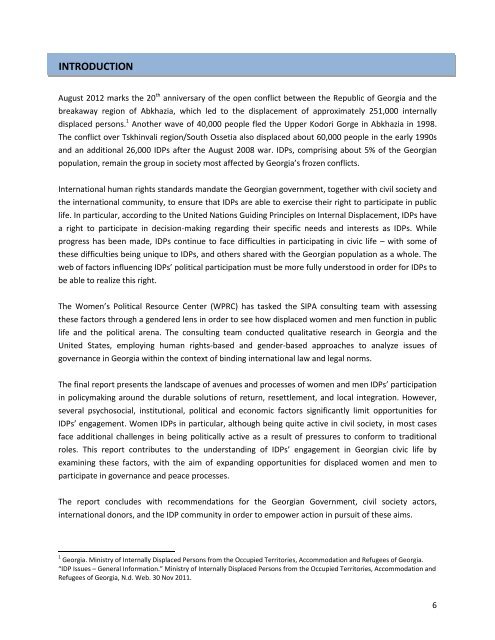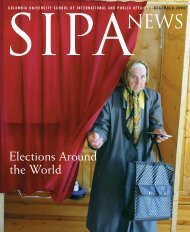EXECUTIVE SUMMARYInternally displaced persons (IDPs) <strong>in</strong> <strong>Georgia</strong>, many liv<strong>in</strong>g <strong>in</strong> protracted displacement s<strong>in</strong>ce the early1990s, face a number of challenges <strong>in</strong> participat<strong>in</strong>g <strong>in</strong> politics <strong>and</strong> peacebuild<strong>in</strong>g. Us<strong>in</strong>g a human-rights<strong>and</strong> gender-based approach, this report assesses the extent to which displaced women <strong>and</strong> men are<strong>in</strong>volved <strong>in</strong> policymak<strong>in</strong>g regard<strong>in</strong>g their needs <strong>and</strong> <strong>in</strong>terests. We focus on policies that promote thedurable solutions as def<strong>in</strong>ed <strong>in</strong> the UN Guid<strong>in</strong>g Pr<strong>in</strong>ciples on Internal Displacement: return,resettlement, <strong>and</strong> local <strong>in</strong>tegration.Avenues of ParticipationStructures <strong>and</strong> processes support<strong>in</strong>g IDPs’ participation certa<strong>in</strong>ly exist, particularly through civil society,<strong>in</strong> which women are disproportionately more active. Policymak<strong>in</strong>g has also become more <strong>in</strong>clusive, butsignificant improvements are needed <strong>in</strong> implement<strong>in</strong>g policies to ensure IDPs’ effective participation<strong>and</strong> enable them to choose among the durable solutions. A ma<strong>in</strong> challenge for achiev<strong>in</strong>g this objectivelies <strong>in</strong> connect<strong>in</strong>g locally-based problems with a coherent national policy approach that IDPs havehelped to formulate.Factors Influenc<strong>in</strong>g EngagementInterconnected psychosocial, political, <strong>in</strong>stitutional <strong>and</strong> economic issues limit IDPs’ engagement <strong>in</strong>decision-mak<strong>in</strong>g <strong>and</strong> public life more generally. For example, shift<strong>in</strong>g gender roles have affected howmen <strong>and</strong> women deal with displacement, creat<strong>in</strong>g burdens <strong>and</strong> opportunities for participation of bothgenders. Political divisions with<strong>in</strong> IDP communities also pose barriers, <strong>in</strong> addition to a lack of consistentpolitical will, <strong>in</strong>stitutional capacity, <strong>and</strong> coord<strong>in</strong>ation among key stakeholders. F<strong>in</strong>ally, poverty canpromote a vicious cycle, h<strong>in</strong>der<strong>in</strong>g participation while the lack of political voice also serves as a keyobstacle to promot<strong>in</strong>g efforts that address this marg<strong>in</strong>alization.RecommendationsIDPs as rights-holders <strong>and</strong> the state <strong>and</strong> other relevant duty bearers hold different levels ofresponsibility <strong>in</strong> address<strong>in</strong>g this situation. We conclude with recommendations for the Government of<strong>Georgia</strong>, <strong>in</strong>ternational organizations, NGOs, <strong>and</strong> IDP communities can enhance IDPs’ voice <strong>in</strong> policiesthat affect them. Systematic <strong>in</strong>clusion of this group, improved governance, <strong>and</strong> <strong>in</strong>creased cooperationamong stakeholders can support IDPs <strong>in</strong> becom<strong>in</strong>g more active <strong>in</strong>dividually <strong>and</strong> organiz<strong>in</strong>g collectively toadvocate for their needs <strong>and</strong> <strong>in</strong>terests. These efforts thereby promote more <strong>in</strong>clusive governance <strong>and</strong>peacebuild<strong>in</strong>g processes <strong>in</strong> <strong>Georgia</strong>n society.5
INTRODUCTIONAugust 2012 marks the 20 th anniversary of the open conflict between the Republic of <strong>Georgia</strong> <strong>and</strong> thebreakaway region of Abkhazia, which led to the displacement of approximately 251,000 <strong>in</strong>ternallydisplaced persons. 1 Another wave of 40,000 people fled the Upper Kodori Gorge <strong>in</strong> Abkhazia <strong>in</strong> 1998.The conflict over Tskh<strong>in</strong>vali region/South Ossetia also displaced about 60,000 people <strong>in</strong> the early 1990s<strong>and</strong> an additional 26,000 IDPs after the August 2008 war. IDPs, compris<strong>in</strong>g about 5% of the <strong>Georgia</strong>npopulation, rema<strong>in</strong> the group <strong>in</strong> society most affected by <strong>Georgia</strong>’s frozen conflicts.International human rights st<strong>and</strong>ards m<strong>and</strong>ate the <strong>Georgia</strong>n government, together with civil society <strong>and</strong>the <strong>in</strong>ternational community, to ensure that IDPs are able to exercise their right to participate <strong>in</strong> publiclife. In particular, accord<strong>in</strong>g to the United Nations Guid<strong>in</strong>g Pr<strong>in</strong>ciples on Internal Displacement, IDPs havea right to participate <strong>in</strong> decision-mak<strong>in</strong>g regard<strong>in</strong>g their specific needs <strong>and</strong> <strong>in</strong>terests as IDPs. Whileprogress has been made, IDPs cont<strong>in</strong>ue to face difficulties <strong>in</strong> participat<strong>in</strong>g <strong>in</strong> civic life – with some ofthese difficulties be<strong>in</strong>g unique to IDPs, <strong>and</strong> others shared with the <strong>Georgia</strong>n population as a whole. Theweb of factors <strong>in</strong>fluenc<strong>in</strong>g IDPs’ political participation must be more fully understood <strong>in</strong> order for IDPs tobe able to realize this right.The Women’s Political Resource Center (WPRC) has tasked the SIPA consult<strong>in</strong>g team with assess<strong>in</strong>gthese factors through a gendered lens <strong>in</strong> order to see how displaced women <strong>and</strong> men function <strong>in</strong> publiclife <strong>and</strong> the political arena. The consult<strong>in</strong>g team conducted qualitative research <strong>in</strong> <strong>Georgia</strong> <strong>and</strong> theUnited States, employ<strong>in</strong>g human rights-based <strong>and</strong> gender-based approaches to analyze issues ofgovernance <strong>in</strong> <strong>Georgia</strong> with<strong>in</strong> the context of b<strong>in</strong>d<strong>in</strong>g <strong>in</strong>ternational law <strong>and</strong> legal norms.The f<strong>in</strong>al report presents the l<strong>and</strong>scape of avenues <strong>and</strong> processes of women <strong>and</strong> men IDPs’ participation<strong>in</strong> policymak<strong>in</strong>g around the durable solutions of return, resettlement, <strong>and</strong> local <strong>in</strong>tegration. However,several psychosocial, <strong>in</strong>stitutional, political <strong>and</strong> economic factors significantly limit opportunities forIDPs’ engagement. Women IDPs <strong>in</strong> particular, although be<strong>in</strong>g quite active <strong>in</strong> civil society, <strong>in</strong> most casesface additional challenges <strong>in</strong> be<strong>in</strong>g politically active as a result of pressures to conform to traditionalroles. This report contributes to the underst<strong>and</strong><strong>in</strong>g of IDPs’ engagement <strong>in</strong> <strong>Georgia</strong>n civic life byexam<strong>in</strong><strong>in</strong>g these factors, with the aim of exp<strong>and</strong><strong>in</strong>g opportunities for displaced women <strong>and</strong> men toparticipate <strong>in</strong> governance <strong>and</strong> peace processes.The report concludes with recommendations for the <strong>Georgia</strong>n Government, civil society actors,<strong>in</strong>ternational donors, <strong>and</strong> the IDP community <strong>in</strong> order to empower action <strong>in</strong> pursuit of these aims.1 <strong>Georgia</strong>. M<strong>in</strong>istry of Internally Displaced Persons from the Occupied Territories, Accommodation <strong>and</strong> Refugees of <strong>Georgia</strong>.“IDP Issues – General Information.” M<strong>in</strong>istry of Internally Displaced Persons from the Occupied Territories, Accommodation <strong>and</strong>Refugees of <strong>Georgia</strong>, N.d. Web. 30 Nov 2011.6
- Page 2 and 3: Promoting IDPs’ and Women’s Voi
- Page 4 and 5: CONTENTSAcronyms and Abbreviations
- Page 8 and 9: THE WOMEN’S POLITICAL RESOURCE CE
- Page 10 and 11: fair reporting on politically sensi
- Page 12 and 13: people-to-people diplomacy efforts
- Page 14 and 15: and the Guiding Principles, in Febr
- Page 16 and 17: an effort to address these stereoty
- Page 18 and 19: The identities, perceptions, and re
- Page 20 and 21: even IDPs themselves. The HRBA seek
- Page 22 and 23: Karaleti settlement, and Potskho-Et
- Page 24 and 25: displacement differently, with men
- Page 26 and 27: on an equal footing with men in for
- Page 28 and 29: The Ministry for Internally Displac
- Page 30 and 31: Defender’s Office) and leave no r
- Page 32 and 33: prominent national level IDP NGO wo
- Page 34 and 35: in the past but none have yet to be
- Page 36 and 37: Grassroots Peacebuilding EffortsCiv
- Page 38 and 39: esettlement and local integration h
- Page 40 and 41: ability to contribute to the new Ac
- Page 42 and 43: Women convened a working group to a
- Page 44 and 45: were involved, in addition to “wo
- Page 46 and 47: towards addressing this population
- Page 48 and 49: waves. 224 A Conciliation Resources
- Page 50 and 51: governing shelter requirements. 238
- Page 52 and 53: esults of eviction on those who did
- Page 54 and 55: FINDINGSSIPA team member Drilon Gas
- Page 56 and 57:
unique opportunities exist for them
- Page 58 and 59:
an important opportunity for women
- Page 60 and 61:
early morning…when I was going to
- Page 62 and 63:
our office to investigate these iss
- Page 64 and 65:
on this? It’s impossible.” 322
- Page 66 and 67:
high levels of unemployment and pov
- Page 68 and 69:
groups do not differentiate between
- Page 70 and 71:
funding and influence to implement
- Page 72 and 73:
een in operation for two years or l
- Page 74 and 75:
organization, and highlighted that
- Page 76 and 77:
The Education System’s Influence
- Page 78 and 79:
system has an important role to pla
- Page 80 and 81:
Political FactorsMany elements of t
- Page 82 and 83:
international organizations working
- Page 84 and 85:
uling party. 433 There were some si
- Page 86 and 87:
especially highly-influential broad
- Page 88 and 89:
ationale behind the government’s
- Page 90 and 91:
international working for a major d
- Page 92 and 93:
Also, according to a World Bank rep
- Page 94 and 95:
willing to challenge authorities th
- Page 96 and 97:
The lack of narrative connecting po
- Page 98 and 99:
RECOMMENDATIONS FOR THE GEORGIAN GO
- Page 100 and 101:
the government also needs to commit
- Page 102 and 103:
‣ Continue to support and expand
- Page 104 and 105:
‣ Address male IDP needs (Immedia
- Page 106 and 107:
The campaign should have a face, su
- Page 108 and 109:
APPENDIX BList of IntervieweesLocal
- Page 110 and 111:
Kristy KellyLincoln MitchellLawrenc
- Page 112 and 113:
Article 10 - Non-discrimination in
- Page 114 and 115:
Principle 18.1 - Adequate standard
- Page 116 and 117:
Esaiashvili, Mariam (Official, Mini
- Page 118 and 119:
Lanskoy, Miriam and Giorgi Areshidz
- Page 120:
Transparency International Georgia.

















